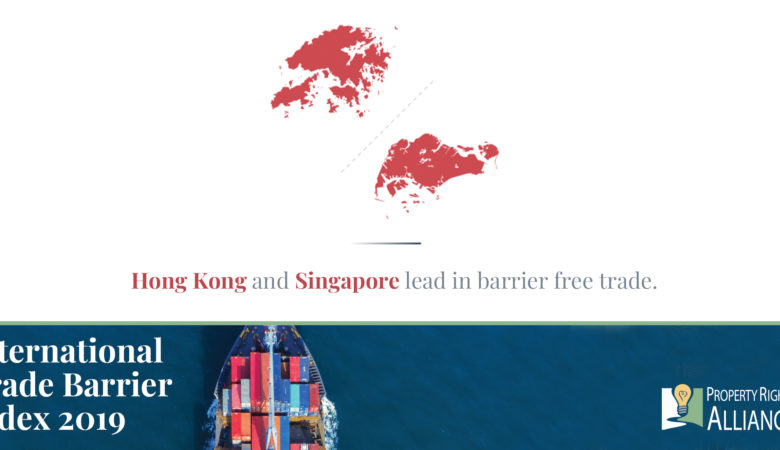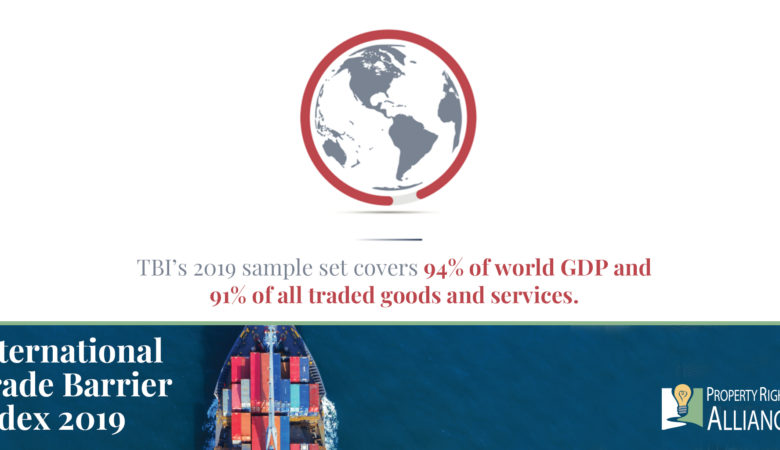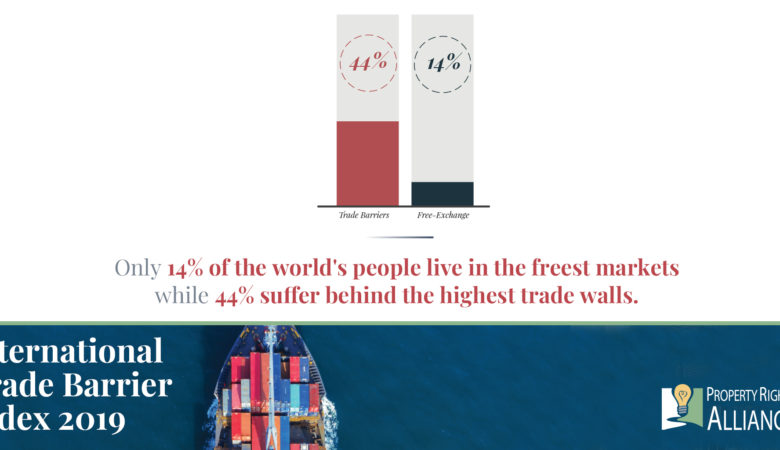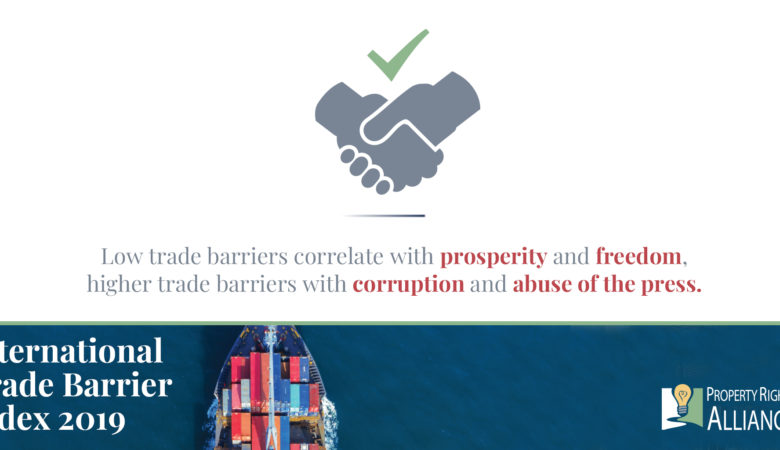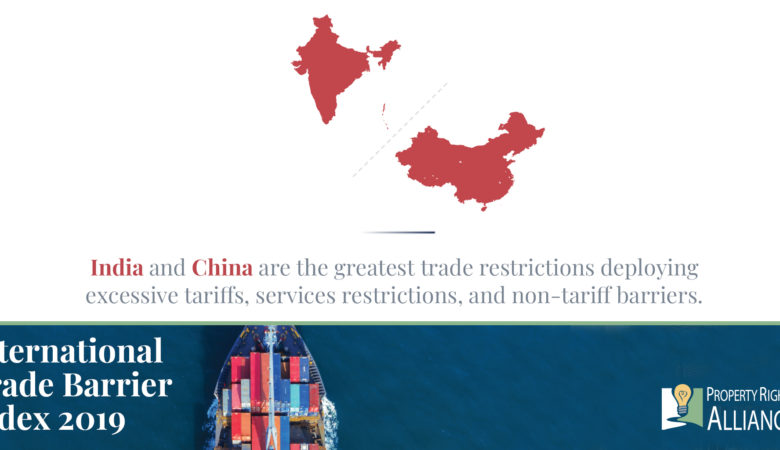2019 International Trade Barrier Index Released
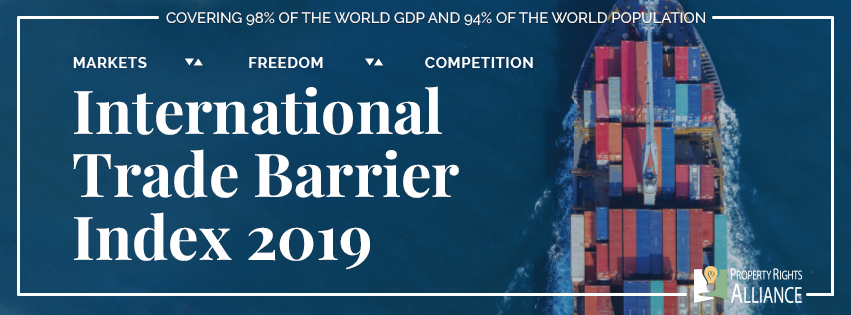
Sao Paulo, Brazil, November 16, 2019
2019 International Trade Barrier Index Released
The global index ranks 86 countries on their use of trade barriers affecting 94% of world’s GDP, 84% of the world’s people, and 91% of traded goods
Sao Paulo, Brazil. Property Rights Alliance is proud to release the world’s first International Trade Barrier Index in partnership with the Mackenzie Center for Economic Freedom.
The Index ranks 86 countries on their use of the most the direct barriers to trade: tariffs, non-tariff measures, and services restrictions, as well as their ability to facilitate trade.
The TBI was created as a response to rising trade tensions across the world that have resulted in lower growth rates, reduced trade forecasts, and an increase in trade restrictions. These conflicts create uncertainty and overlook the real issues that disrupt global commerce.
Key Findings
China and India are the world worst abusers of trade barriers. Each have extremely high tariffs and a large number of tariff lines compared to the rest of the world. India leads in restrictions on services that prevent foreign professionals and businesses from operating in the country. While China leads the world in use of non-tariff measures.
Hong Kong and Singapore have the lowest scores on the Index indicating the fewest trade restrictions. Both are completely tariff free. Hong Kong is 2nd as Singapore is a member of more trade agreements. However, with open and unfettered trade citizens of Hong Kong are accustomed to the free-exchange of ideas. Recent NTMs raised by Beijing to require licenses for imported published material have added to the friction between the two regions. See “Free Trade and Free Minds” in the full TBI report.
The United States is 54th in the Index. Though the country has one of the lowest average tariff rates it follows China’s lead in deployment of NTMs and has signed relatively few trade agreements. To president Trump’s credit, he has started trade negotiations with some of the biggest abusers of free-trade: China, Brazil, India, and Turkey. If the end result is increased protection of property rights, fewer restrictions on services, smoother compliance with technical barriers, lower tariffs, and implemented trade agreements then Trump could be known as the Free-Trade president.
The EU has relatively few trade barriers, though some can be quite restrictive. NTMs have resulted in a de facto ban on certain agricultural products and services restrictions in the transport sector amount to restrictive cabotage rules. Most alarming, regulations on privacy controls and new digital service taxes are digital trade barriers that threaten to pull the region backwards.
When barriers are removed it is harder for special interests to become entrenched in political processes. Correlations with the TBI demonstrate a clear relationship between free-trade and the ability of countries to achieve greater levels of freedom and prosperity. Notably, where trade barriers are high, abuse of the press and the perception of corruption are also high. See the Executive Summary for data on Pearson correlations.
Case Studies
Trade barriers raise prices and reduce choices. However, data can’t tell the whole story on the harms they cause. The TBI includes case studies from international think tanks that illustrate how barriers harm people, as well as the opportunities that lie ahead from lowering barriers.
- The Jones Act: Washington’s Ultimate Swamp, By: Colin Grabow, Cato Institute (USA)
- The Health and Price Effects of Indonesia’s Trade Restrictions on Rice, By: Galuh Hatta and M. Diheim Biru, Center for Indonesian policy Studies (Indonesia)
- Reducing Trade Barriers through trade Agreements: the Case of Japan, By: Yuya Watase and Keiun Satosh, Pacific Alliance Institute (Japan)
- New Digital Service Taxes as Trade Barriers, By: Matthiaus Bauer, European Centre for International Political Economy (EU)
- Overcoming Pink Taxes in Sri Lanka, By: Anuki Premachandra, Advocata Institute (Sri Lanka)
- Open to the World: Brazil’s Opportunities in a Free World, By: Mauricio Freitas Bento, Property Rights Alliance (Brazil)

